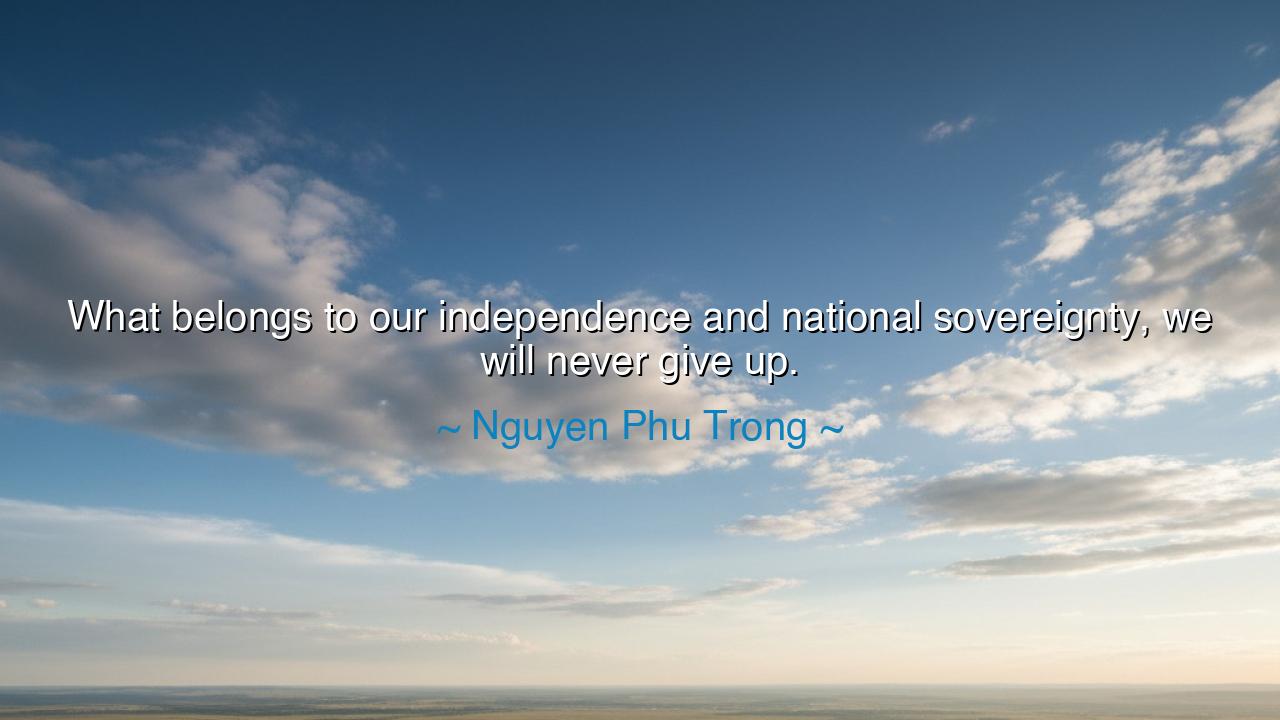
What belongs to our independence and national sovereignty, we






The words of Nguyen Phu Trong, spoken with the gravity of one who bears the memory of his nation’s trials, are a declaration both fierce and sacred. When he proclaimed, “What belongs to our independence and national sovereignty, we will never give up,” he gave voice to the eternal vow of a people who have endured the crucible of conquest, division, and struggle, yet have never surrendered their spirit. His statement is not merely political—it is ancestral. It is the echo of generations who bled for the right to call their land their own, a solemn promise that no wealth, no pressure, no foreign power shall ever purchase the soul of Vietnam.
To understand the origin of this quote, one must first understand the history from which it arises. Nguyen Phu Trong, the General Secretary of the Communist Party of Vietnam, uttered these words in the twenty-first century, but their roots stretch back through centuries of struggle. Vietnam has known the long shadow of foreign domination—from a thousand years under Chinese rule, to nearly a century of French colonization, to decades of brutal war against foreign intervention in the modern era. Through each of these storms, the Vietnamese people never ceased to fight for independence and sovereignty, believing these were not luxuries to be negotiated, but birthrights to be defended at any cost. Trong’s words, therefore, are both a reflection of history and a reaffirmation of destiny—a warning to the world that the Vietnamese spirit bows to no force but truth, justice, and its own will.
The tone of his statement carries the moral fire of nations that have suffered and endured. To say, “we will never give up,” is to declare that there exists something sacred beyond material possession—something that no army can conquer, no treaty can extinguish. Independence, in his meaning, is not merely the absence of occupation; it is the fullness of dignity, the right to determine one’s own fate, to speak with one’s own voice, and to walk upright in the world. National sovereignty, then, is the embodiment of that independence on the global stage—the defense of borders, culture, and values from external control. Trong’s words stand as both a shield and a torch: a shield against domination, and a torch illuminating the path of self-determination for future generations.
The story of Vietnam’s long journey toward independence is itself a living testament to his words. In 1945, after centuries of subjugation, Ho Chi Minh stood before his people and proclaimed the birth of the Democratic Republic of Vietnam, invoking the same universal ideals found in the American Declaration of Independence—that all peoples are created equal, and that they have the right to govern themselves. Yet even after that declaration, the struggle continued, through the bitter wars of the twentieth century. The French returned, only to be defeated at Dien Bien Phu in 1954. The Americans came, bringing with them destruction and division, but the Vietnamese, guided by the unbreakable will of unity, prevailed again. Through famine, fire, and foreign invasion, the nation proved that it would rather suffer in freedom than live in submission. It is from this furnace of sacrifice that Trong’s statement draws its steel.
In the tone of the ancients, we may say: the land remembers the footsteps of those who defended it, and their courage flows in the veins of those who inherit it. When Nguyen Phu Trong speaks of never giving up what belongs to independence and sovereignty, he is not speaking as one man but as the voice of a thousand years of resilience. His words remind us that freedom, once won, must be guarded—not with arrogance, but with vigilance. For history has shown that liberty, if not protected, can be stolen not only by conquerors with armies but by temptations of wealth, influence, and complacency. The chains of the modern world are subtle—they come not with swords, but with trade, dependency, and the erosion of self-belief.
The meaning of Trong’s words, therefore, extends beyond the borders of Vietnam—it speaks to every nation, every people, every individual who has known oppression and longs for dignity. Independence is not a state granted by others—it is an inner flame, sustained by courage, unity, and principle. A country may be free in name yet enslaved in spirit if it forgets the sacrifices that bought its liberty. And an individual, too, may surrender sovereignty not to a foreign power but to fear, conformity, or greed. True sovereignty, whether of a nation or a person, is the mastery of self—the power to live by one’s values, to act with integrity, and to bow to no falsehood.
The lesson of Nguyen Phu Trong’s words is both solemn and empowering: that the treasures of independence and sovereignty are sacred trusts, not to be traded or compromised. They are the inheritance of the brave, the reward of the steadfast, the duty of the living to the dead. The freedom that is not defended will decay; the sovereignty that is not respected will vanish.
And so, the practical path is clear: guard what is yours—your dignity, your truth, your independence—as you would guard your life. For a nation, that means strengthening unity, preserving culture, and standing firm in principle even amidst global pressures. For an individual, it means living by conviction, resisting corruption, and refusing to be ruled by fear or deceit. As Nguyen Phu Trong reminds us, the essence of freedom lies not in the word “independence,” but in the will to protect it. And when that will burns bright in the hearts of a people, no empire can extinguish it, and no storm can shake it.






AAdministratorAdministrator
Welcome, honored guests. Please leave a comment, we will respond soon